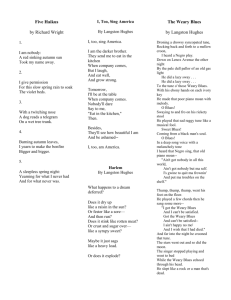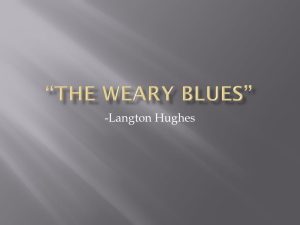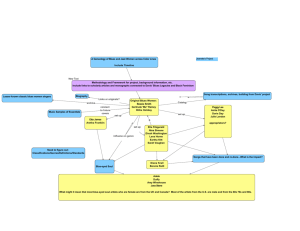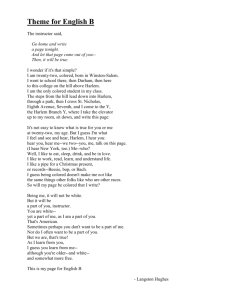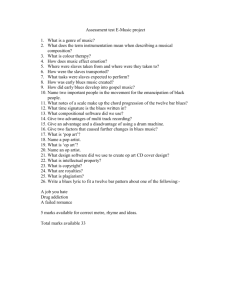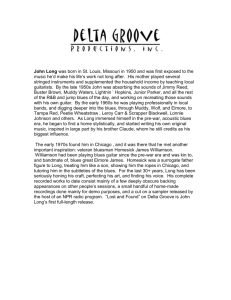amlitmonday27
advertisement
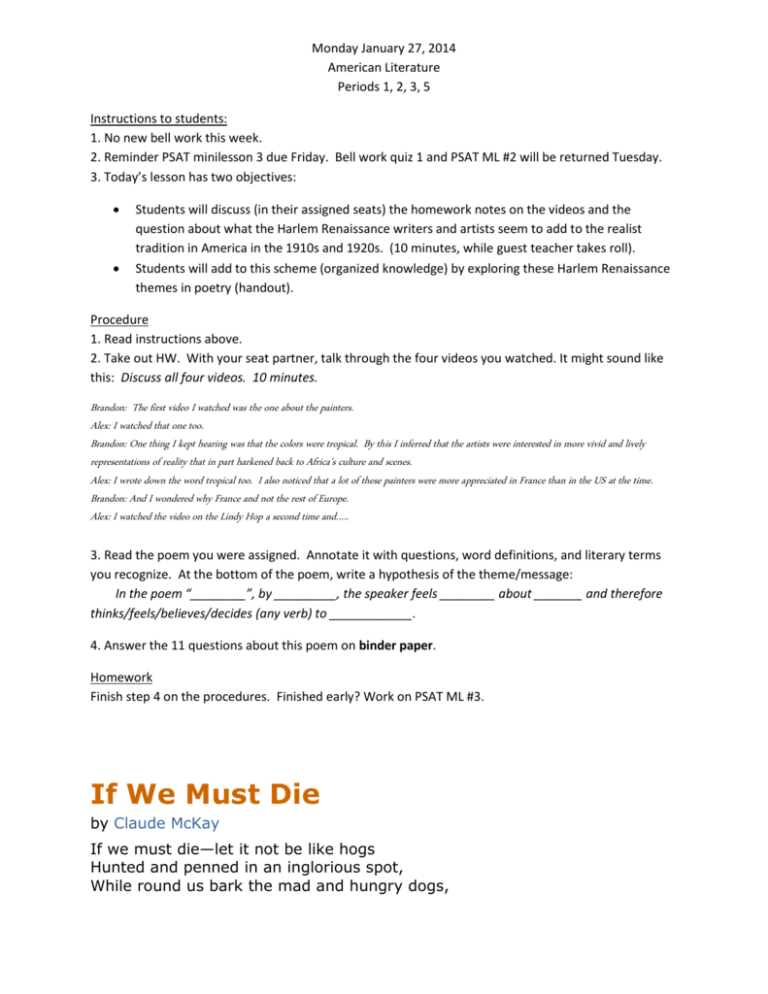
Monday January 27, 2014 American Literature Periods 1, 2, 3, 5 Instructions to students: 1. No new bell work this week. 2. Reminder PSAT minilesson 3 due Friday. Bell work quiz 1 and PSAT ML #2 will be returned Tuesday. 3. Today’s lesson has two objectives: Students will discuss (in their assigned seats) the homework notes on the videos and the question about what the Harlem Renaissance writers and artists seem to add to the realist tradition in America in the 1910s and 1920s. (10 minutes, while guest teacher takes roll). Students will add to this scheme (organized knowledge) by exploring these Harlem Renaissance themes in poetry (handout). Procedure 1. Read instructions above. 2. Take out HW. With your seat partner, talk through the four videos you watched. It might sound like this: Discuss all four videos. 10 minutes. Brandon: The first video I watched was the one about the painters. Alex: I watched that one too. Brandon: One thing I kept hearing was that the colors were tropical. By this I inferred that the artists were interested in more vivid and lively representations of reality that in part harkened back to Africa’s culture and scenes. Alex: I wrote down the word tropical too. I also noticed that a lot of these painters were more appreciated in France than in the US at the time. Brandon: And I wondered why France and not the rest of Europe. Alex: I watched the video on the Lindy Hop a second time and….. 3. Read the poem you were assigned. Annotate it with questions, word definitions, and literary terms you recognize. At the bottom of the poem, write a hypothesis of the theme/message: In the poem “________”, by _________, the speaker feels ________ about _______ and therefore thinks/feels/believes/decides (any verb) to ____________. 4. Answer the 11 questions about this poem on binder paper. Homework Finish step 4 on the procedures. Finished early? Work on PSAT ML #3. If We Must Die by Claude McKay If we must die—let it not be like hogs Hunted and penned in an inglorious spot, While round us bark the mad and hungry dogs, Making their mock at our accursed lot. If we must die—oh, let us nobly die, So that our precious blood may not be shed In vain; then even the monsters we defy Shall be constrained to honor us though dead! Oh, Kinsmen! We must meet the common foe; Though far outnumbered, let us show us brave, And for their thousand blows deal one deathblow! What though before us lies the open grave? Like men we'll face the murderous, cowardly pack, Pressed to the wall, dying, but fighting back! The Tropics of New York by Claude McKay Bananas ripe and green, and ginger root Cocoa in pods and alligator pears, And tangerines and mangoes and grape fruit, Fit for the highest prize at parish fairs, Sat in the window, bringing memories of fruit-trees laden by low-singing rills, And dewy dawns, and mystical skies In benediction over nun-like hills. My eyes grow dim, and I could no more gaze; A wave of longing through my body swept, And, hungry for the old, familiar ways I turned aside and bowed my head and wept. Storm Ending by Jean Toomer Thunder blossoms gorgeously above our heads, Great, hollow, bell-like flowers, Rumbling in the wind, Stretching clappers to strike our ears . . . Full-lipped flowers Bitten by the sun Bleeding rain Dripping rain like golden honey— And the sweet earth flying from the thunder. The Debt by Paul Laurence Dunbar This is the debt I pay Just for one riotous day, Years of regret and grief, Sorrow without relief. Pay it I will to the end— Until the grave, my friend, Gives me a true release— Gives me the clasp of peace. Slight was the thing I bought, Small was the debt I thought, Poor was the loan at best— God! but the interest! Mother Night by James Weldon Johnson Eternities before the first-born day, Or ere the first sun fledged his wings of flame, Calm Night, the everlasting and the same, A brooding mother over chaos lay. And whirling suns shall blaze and then decay, Shall run their fiery courses and then claim The haven of the darkness whence they came; Back to Nirvanic peace shall grope their way. So when my feeble sun of life burns out, And sounded is the hour for my long sleep, I shall, full weary of the feverish light, Welcome the darkness without fear or doubt, And heavy-lidded, I shall softly creep Into the quiet bosom of the Night. The Weary Blues by Langston Hughes Droning a drowsy syncopated tune, Rocking back and forth to a mellow croon, I heard a Negro play. Down on Lenox Avenue the other night By the pale dull pallor of an old gas light He did a lazy sway . . . He did a lazy sway . . . To the tune o' those Weary Blues. With his ebony hands on each ivory key He made that poor piano moan with melody. O Blues! Swaying to and fro on his rickety stool He played that sad raggy tune like a musical fool. Sweet Blues! Coming from a black man's soul. O Blues! In a deep song voice with a melancholy tone I heard that Negro sing, that old piano moan— "Ain't got nobody in all this world, Ain't got nobody but ma self. I's gwine to quit ma frownin' And put ma troubles on the shelf." Thump, thump, thump, went his foot on the floor. He played a few chords then he sang some more— "I got the Weary Blues And I can't be satisfied. Got the Weary Blues And can't be satisfied— I ain't happy no mo' And I wish that I had died." And far into the night he crooned that tune. The stars went out and so did the moon. The singer stopped playing and went to bed While the Weary Blues echoed through his head. He slept like a rock or a man that's dead. Ships That Pass in the Night by Paul Laurence Dunbar Out in the sky the great dark clouds are massing; I look far out into the pregnant night, Where I can hear a solemn booming gun And catch the gleaming of a random light, That tells me that the ship I seek is passing, passing. My tearful eyes my soul's deep hurt are glassing; For I would hail and check that ship of ships. I stretch my hands imploring, cry aloud, My voice falls dead a foot from mine own lips, And but its ghost doth reach that vessel, passing, passing. O Earth, O Sky, O Ocean, both surpassing, O heart of mine, O soul that dreads the dark! Is there no hope for me? Is there no way That I may sight and check that speeding bark Which out of sight and sound is passing, passing? Invitation to Love by Paul Laurence Dunbar Come when the nights are bright with stars Or come when the moon is mellow; Come when the sun his golden bars Drops on the hay-field yellow. Come in the twilight soft and gray, Come in the night or come in the day, Come, O love, whene'er you may, And you are welcome, welcome. You are sweet, O Love, dear Love, You are soft as the nesting dove. Come to my heart and bring it to rest As the bird flies home to its welcome nest. Come when my heart is full of grief Or when my heart is merry; Come with the falling of the leaf Or with the redd'ning cherry. Come when the year's first blossom blows, Come when the summer gleams and glows, Come with the winter's drifting snows, And you are welcome, welcome. Life is Fine by Langston Hughes I went down to the river, I set down on the bank. I tried to think but couldn't, So I jumped in and sank. I came up once and hollered! I came up twice and cried! If that water hadn't a-been so cold I might've sunk and died. But it was Cold in that water! It was cold! I took the elevator Sixteen floors above the ground. I thought about my baby And thought I would jump down. I stood there and I hollered! I stood there and I cried! If it hadn't a-been so high I might've jumped and died. But it was High up there! It was high! So since I'm still here livin', I guess I will live on. I could've died for love— But for livin' I was born Though you may hear me holler, And you may see me cry— I'll be dogged, sweet baby, If you gonna see me die. Life is fine! Fine as wine! Life is fine!
